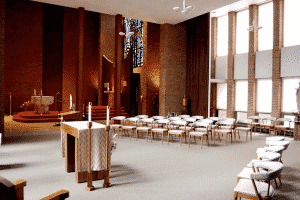May 7, 2018
A Monthly Newsletter for Paulist Associates
The Associates World is the newsletter of the Paulist Associates. You can download a copy of this newsletter in PDF format (excellent for printing), or scroll down to read it in your Web browser.
- What Does It Mean Today To Be Ecumenical?
- Details on the Upcoming Election of Board Members
- Registration Remains Open for the Retreat in July
- United in Doing God’s Will — Hospitality and Breakfast
- Isaac Says…
- Paulist Ordination Celebrations — May 17 to 20
- Grand Rapids Reflects on Isaac Hecker
- And What Do You Do With Your Time?
- Rich Thoughts
- Personal Encounter
- Proposed Program for June
- Consider submitting an article for inclusion in an upcoming issue of The Associates World
- Prayer for the Intercession of Father Isaac T. Hecker
- Contacts
- Promise
by Fr. Tom Ryan, CSP
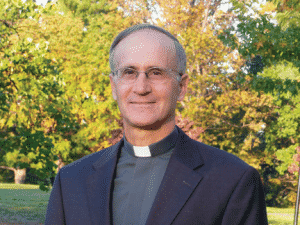
Recently a friend asked, “What does being ‘ecumenical’ mean?” It was one of those questions that stop you cold because the answer goes off in so many directions you don’t know where to begin. Later, I took paper and pencil in hand and began to reflect on the lessons of my last 25 years in ecumenical work.
Here are some of the things which, in my experience, “being ecumenical” means?
1. To pray regularly for the unity of the Church, as Christ wills it and when he wills it. As theologian, Yves Congar, said; “The way through the door of unity is on our knees.” Prayer is important because prayer’s effect is in us. Prayer changes our hearts, and it is our hearts that most of all need to be changed.
2. To be rooted in a particular Christian tradition, to know it well, and to be able to present to others the coherency of that tradition’s response to the Gospel. The genuine ecumenists are not at the margin of their church’s life, but at the heart of it. They know what is important in the Christian life and can recognize those elements in other churches even if they may be differently expressed.
3. To take an active part in the careful and honest appraisal of whatever needs to be done for the renewal of one’s own church. Ecumenism is not a specialty within the Church, but an expression of every dimension of its life. It helps the Church to be more the Church and to be faithful to her calling. Dialogue is the meeting of churches.
4. To be fascinated and curious about that which is different. To risk peeping out of our provincial perspectives and opening ourselves to the bigger picture. Ecumenism is a way of living that dares to think globally and live trustfully with differences in community.
5. To be willing to learn. Truth is seldom discovered in isolation but rather through dialogue in diverse community. Each Christian tradition has preserved better than others one or more aspects of the mystery of God’s work in Christ. The work of unity aims at restoring the fullness to our common appreciation of that mystery.
6. To cultivate a historical consciousness. We’re on a journey. The church we have is not the church God wants. An ecumenically minded person refuses to worship false gods, and the present expression of the church is not God. Similarly, there is a refusal to make absolute a stage of development that is only the next step on the way to something greater.
7. To be ready to celebrate vitality in the body of Christ wherever it is found. What advances the reign of God in any church helps all churches. The churches are not like competing corporations in the business world, so that the stakes of one rises as the lot of others falls. Any loss of divine truth and life is a loss to Christ and his Church. The only triumph a Christian seeks is that of Jesus and his cross. Our rivalry is not with one another, but with sin.
8. To be willing to work together. Ecumenism is an understanding of human society that identifies fear of the “other” as one of the greatest evils we face. The principle given to all the churches for their life together is: Do everything together as far as conscience permits.
9. To feel the scandal of our divisions. Unity is for mission. Our primary mission is to announce the Good News. The message we joyfully proclaim is that we are reconciled to God and to one another through the life, death and resurrection of Jesus. “Being ecumenical” means feeling a holy unrest at our failure to live consistent with our message, more interested in proving our “rightness” and the other’s “wrongness” than in seeking together to know what the Spirit is asking of us and to do it.
10. To be open to God’s will for the Church...Our unity is God’s gift, and the way to give more visible expression to that gift will also be God’s gift. But we will have to empty ourselves of our self-righteousness and let go of our power games in order to let this be God’s work.
11. To appreciate the important role of provisional regulations and church structures in our evolution from alienation to reconciliation. To accept that the only constant is change and the only refuge is the insecure security of faith. To struggle against the temptation to live in a closed, safe, secure system that reduces our level of fear and satisfies our desires for control. God is a verb. And in the dynamism of the provisional, God’s Spirit is at work, endlessly correcting, improving, adjusting, reorienting.
12. To have an appreciation for the hierarchy of truths in Christian doctrine. A belief has greater or lesser consequence in the measure in which it relates to the foundation of the Christian faith. Grace has more importance than sin, the mystical aspect of the Church more than it’s juridical, the Church’s liturgy more than private devotions, baptism more than penance, the Eucharist more than the anointing of the sick. Placing the greater stress on those doctrines in closest relation to the heart of Christian faith enables us to build further agreement.
13. To try to understand others as they understand themselves. To avoid any expression, judgment or action that falsifies their condition. Ecumenical honesty means we do not look upon others through the prism of their weakest elements, or over generalize their positions with statements like “Protestants say … Anglicans do … Orthodox are … Catholics will …” Rather, our ideals are put next to their ideals, our practices next to their practices, as opposed to our ideals next to their practices.
14. To be alert to the presence of God and the action of the Holy Spirit in the lives of other Christians and members of other living faiths. The Church of God does not have a mission as much as the mission of God has a church. The Church is the sign and sacrament of God’s presence in the world, but God’s activity is by no means limited to the Church and its members. The Church serves the advance of the Kingdom but is not tantamount to it.
15. To have a biblical patience. Biblical patience calls for creative waiting, doing now what we can instead of moaning about what church disciplines will not allow us to do. It means being willing to accept or absorb negativity so that the person who is the source of it will eventually go beyond it. Christ suffered for unity. At times so will we. Biblical patience involves staying with it, searching for the healing that comes from understanding and forgiveness.
Everyone is in favor of Christian unity. Some are even willing to work for it. But few are willing to suffer for it.
Fr. Tom Ryan leads the Paulist National Office of Ecumenical and Interfaith Relations. You may read his newsletters at tomryancsp.org. You may also wish to visit the find more information about the Office of Ecumenical and Interfaith Relatons, “the Gospel Call”, the Koinonia quarterly newsletter, and upcoming events.
by Fr. Frank Desiderio, CSP
The Paulist Associates Handbook states:
“The Paulist Associates are led by a Director of the Associates, appointed by the President of the Paulist Fathers. He is part of the Associates Board, which is composed of two other Paulists and four Associates chosen by ballot by active Paulist Associates.”
The Paulist Associates Board decided that there should be term limits of four years for Board members. This year two Board members, Paula Cuozzo and Angela Barbieri will be leaving the Board; we will have an election to fill their seats. Continuing on the Board are Cathy Hoekstra and Katherine Murphy, as well as Frs. Mike Kallock and Joe Scott.
When we did our election four years ago I asked each group to meet and propose one candidate for a four-year term. This year, I would again like each local Paulist Associates group, which does not already have an Associate on the Board, to take time at their April or May meeting to discuss who they think would be a good candidate and encourage that person to be nominated for the Board election. (The Board decided that any group that had a member on the Board already would not propose a nominee. Thus, this year there is no additional nominees from Grand Rapids and Columbus since Cathy Hoekstra and Katherine Murphy are already on the Board.)
By June 1 each nominee should write a two-paragraph candidate statement and send it to me. In the statement the candidate should offer a brief biography and say what gifts they believe they bring to the Board and their vision for the future of the Paulist Associates. The nominee should also send along a picture.
I will send the candidate statements out by e-mail on or around June 2nd. The period between June 2 and 23rdwill be a time for Associates to discuss the different candidates, pray and discern with each other about the best candidates for the Board.
An e-mail will be sent to each active Associate on June 25th with a link to an electronic ballot. The election will take place the week of June 25th and closing out on July 2nd. Each Associate will have two votes. If a member of your group does not have e-mail then that member can either:
- give their votes to the coordinator of the local group to send to me in an e-mail
- or the member can send me a signed letter with their two votes to arrive no later than July 2nd. My address in June is:
Frank Desiderio, CSP
St. Mary’s of the Lake
3535 State Route 9L
Lake George, NY 12845
The two Associates with the highest number of votes, a simple majority, will be elected. In case of a tie we will have a run-off election. If one of those elected has to resign during their tenure, then the candidate with the next highest number of votes will move into the vacancy.
The results of the election will be announced on July 3rd, 2018.
May the Holy Spirit guide the Paulist Associates in this election and in all your local endeavors.
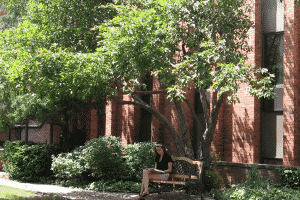
She is also pleased to report that she take additional registrations (as long as there is sufficient room at the retreat house.) So, we again extend an invitation to Paulist Associates to register for this retreat. You may find the registration form here.
When the form is complete, please send it with a deposit check to Dorothy. Her contact information is on the registration form.
As a reminder, the inspiration for this retreat’s theme is the Apostolic Exhortation, Evangelii Gaudium (The Joy of the Gospel), issued in 2013 by Pope Francis.
The retreat is also based on a passage of St. Paul’s first letter to Thessalonians, verse 16 to 18: “Rejoice always. Pray without ceasing. In all circumstances give thanks, for this is God’s will for you in Christ Jesus.”
We are grateful to Dorothy, Fr. Mike Kallock, CSP, and the Chicago Associates for all their work to date (and the work that they will be doing over the next couple of months) to make this a fruitful and enjoyable retreat for all.
- Theme: The Role of the Holy Spirit in a Life of Joy, Prayer, and Gratitude
- Where: The Cenacle Retreat and Conference Center, located at 513 West Fullerton Parkway in Chicago
- Check In: Friday, July 13th between 3 and 5 pm
- Check Out: Sunday, July 15th after lunch
Accommodations and Meals: Single rooms are $245 for the weekend; double rooms are $201 per person for the weekend. Meals are included.
Transportation: The retreat center is nearby public transportation, and there is parking for 30 vehicles.
10. The Gospel offers us the chance to live life on a higher plane, but with no less intensity: “Life grows by being given away, and it weakens in isolation and comfort. Indeed, those who enjoy life most are those who leave security on the shore and become excited by the mission of communicating life to others”.[4] When the Church summons Christians to take up the task of evangelization, she is simply pointing to the source of authentic personal fulfilment. For “here we discover a profound law of reality: that life is attained and matures in the measure that it is offered up in order to give life to others. This is certainly what mission means”.[5]Consequently, an evangelizer must never look like someone who has just come back from a funeral! Let us recover and deepen our enthusiasm, that “delightful and comforting joy of evangelizing, even when it is in tears that we must sow… And may the world of our time, which is searching, sometimes with anguish, sometimes with hope, be enabled to receive the good news not from evangelizers who are dejected, discouraged, impatient or anxious, but from ministers of the Gospel whose lives glow with fervour, who have first received the joy of Christ”.
Evangelii Gaudium (The Joy of the Gospel)
The Holy Spirit is received by the sacramental grace of baptism,
and renewed by the other sacraments; also in prayer …
hearing sermons, reading the Scriptures or devout books,
and on occasions, extraordinary or ordinary, in the course of daily life.(primary source unavailable; “The Guidance of the Holy Spirit,”
The Paulist Vocation, p.131)
by Peggy Lavoie — Paulist Associate from Boston
“Let us be united in doing His will, and in letting it be done in us.”
From letter of Fr. Isaac Hecker, August 2, 1864, in The Paulist Vocation, page 82
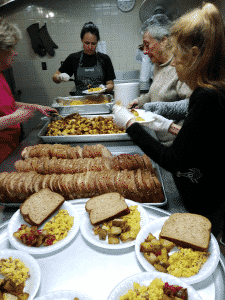
When starting this program, I hoped to serve those in need but could not have anticipated the effects it would have beyond preparing the meal, setting the tables, serving the guests and, of, course, cleaning up afterward. Over the years, many volunteers, ranging in age from high school students to senior citizens, give up several hours early on a Saturday morning to provide a welcoming community atmosphere to those who too often go unnoticed. The interactions between guests and volunteers go beyond providing a healthy meal. Over time, stories have been shared and the lives of guests and volunteers alike have been deeply affected. Guests have often told us how they look forward to this meal each month and seeing volunteers they’ve come to know as friends.
My own life has been deeply affected as well by the wonderful people I have met, some of whom are now fellow Associates. Some young volunteers have been inspired to pursue careers in public health or social service. One in particular will be graduating from American University in Washington DC this Spring, having been a Fulbright Canada Scholar last semester. Groups of students from St. Sebastian’s High School have been coming for many years, giving up a morning of sleep, something cherished by high school boys everywhere, to come and work and provide welcome company for our guests. Family groups have come to share a rich experience not found elsewhere. One volunteer was introduced to the Breakfast by her sister and, now that her sight is failing, is brought to volunteer by her son or another one of her children – a family tradition in the making.
What Fr. Hecker wrote over 150 years ago is still very true: we are united in doing God’s will, and in letting it be done in us. Being open to many, often unexpected, sources of inspiration is an important part of our continuous spiritual growth. I am grateful to the Paulist Fathers and the Associates for providing me this ongoing source of growth and pray that my fellow Breakfast volunteers will continue to experience the same.
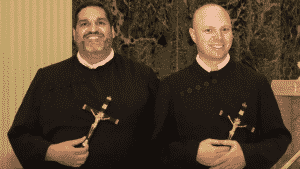
Paulist Associates are invited to the ordination Mass as well as some additional events during this long weekend.
On Thursday, May 17, there will be a Mass at 5:30 pm at St. Paul the Apostle Church in thanksgiving for Paulists who are celebrating ordination anniversaries. At 6:15 pm, Associates are welcome to the dinner, which is followed by a community gathering for Paulists, Paulist Associates, and invited guests.
A tour of St. Paul the Apostle Church is scheduled for 2 pm on Friday, May 18. There is also a reception in the Auditorium for Paulists and Paulist Associates from 5:30 to 6:30 pm.
The ordination Mass will be held at 10 am on Saturday, May 19 at St. Paul the Apostle Church, followed by a reception in the auditorium.
On the following day, Sunday, May 20, Fr. Ryan Casey, CSP will celebrate his first Mass at 10:00 am, and Fr. Michael Hennessey will celebrate his first Mass at 5:15 pm at St. Paul the Apostle Church.
If you are interested in lodging at The Watson Hotel or Bishop Malloy Retreat House, please visit stpaultheapostle.org.
- click on the “About Our Church” tab
- drop down to “Ordination Rooms”
- then click on “here”
We hope as many Paulist Associates as possible will join in this wonderful celebration. We also ask everyone to keep Deacon Ryan and Deacon Michael in prayer as they make their final preparations for their ordination.
“The Christian Church dates her birth from the day of Pentecost, when she was endowed from on high with the never failing presence of the Holy Spirit who is her indwelling life and power.
1876, “On the Mission of New Religious Communities,” The Paulist Vocation, p. 276
New beginnings are often disguised by painful endings. The Ascension of our Lord may have signaled the end of an era, the age of Jesus’ earthly presence, but it also gave birth to the beginning of a new era—the age of the Church at Pentecost. It is from the day of Pentecost, as Servant of God Isaac Hecker notes, the Holy Spirit became the Church’s indwelling life and power. The Church, the body of Christ, is thus able to remain in union with the Head, Jesus Christ, and is guided and empowered by the Holy Spirit to preach the good news of God’s unconditional salvific love through Jesus Christ.
By allowing the Holy Spirit to work in us, individually and collectively, the Church draws others into that special relationship with God the Father whom Jesus made known. As a pilgrim people journeying back to God the Father we are never alone but guided, empowered and called to unity by the Holy Spirit. So what may look like a painful ending can be a transition to a new beginning, a gift offered to us by the God of surprises who invites us to trust in God’s presence and live in hope.
by Mary Burke — Paulist Associate from Boston
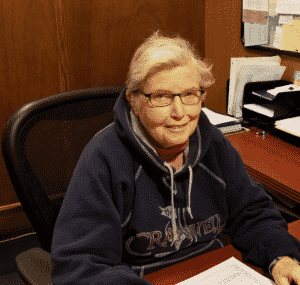
I hung up the phone and turned toward the person in the doorway, who was looking for a Mass card. At the same time, I was pressing the “admit button” to open the inside door to allow Vi to get to the AA Women’s meeting on the second floor; she’s a regular. The phone rang once more before I got the Mass Card recorded. Then, for the next 20 minutes, it was quiet — no phones, no people, only voices and noise from Park Street.
I was volunteering at the desk in the Reception Office of the Paulist Center, in downtown Boston, temporarily relieving the Receptionist. I’ve been doing this coverage intermittently since the 1990’s. Then I was the only volunteer then; now there is a small team that steps in as needed.
When I first began, I assumed that all I had to do was send a visitor or a phone call to the right person — easy enough. I quickly learned that there were more people here than I knew as the Center rented out some space. That first year I was the originator of many phone calls, looking for help from the staff. Most of the questions were routine, and I’ve learned the answers, much to the staff’s relief. Many days the parade of people did and still keeps me busy. There are volunteers for many activities; community members wanting information; people looking for Mass cards; questions about our food pantry and Supper Club for those needing food; and needy and homeless people wanting to know about possible services. Visitors looking for the Chapel and some looking for the long-gone book store often trigger conversations about the history of the Paulist Center, the Paulists, and sometimes the many changes in Boston.
Over the years, I’ve also received a special education that has enriched my life significantly. A couple of full-time receptionists developed their own ministry. As needy and homeless people came in week after week asking for the same help, which the Paulist Center often could not provide, they developed answers, some of which became lists: where was a meal being served that night, a place to sleep, a place to help find a job; who might help with a legal issue, such as immigration? They learned that other people had also made lists, and in time combined lists became important resources. Some people just wanted a place to sit, maybe out of the rain or cold, for a short time. Others really wanted someone just to listen.
One receptionist formed a cadre of needy, homeless, and lonely people, to do chores such as stuff envelopes or bulletins, getting to know these individuals and their stories while getting some tasks done easily. If I was around, he introduced me to team of the day. My ideas about street people today are very different than they were in the 1990’s.
I also know more about resources, and have learned to just listen.
For about six months last year, the Paulist Center facilitated a Friday Noon worship service for Muslims working in the neighborhood while their usual meeting place was being rehabbed. At about 11:30 am, three or four men arrived to retrieve packed away rugs and other needs, and change our auditorium into a prayer space. Shortly after noon, a 10-minute flood of people, mostly men, arrived. They were young, old, well dressed and not, “needing a shave” and fully bearded, of every race, ethnicity, and color, friendly and focused only on getting to worship. They remained for about half an hour, then about 10 minutes after they left there was a repeat. This was an every Friday event, not just a special holiday. I was challenged by their steadfast witness to faith in coming to worship in a secular, Christian society.
I’m sometimes asked about why I do this, especially as a volunteer. That’s easy to answer; it’s my contribution to the Paulist Center. Equally important, I enjoy it. I’m never bored; I meet interesting people, including Paulists, some of whom challenge my ideas of what it means to be a Catholic Christian, and I’ve come to an understanding of the demands on a down-town parish. In responding to visitors, I get to show off what I’ve learned as a Paulist Associate about Isaac Hecker and Paulist history. It’s a meaning-filled and rewarding use of my time.
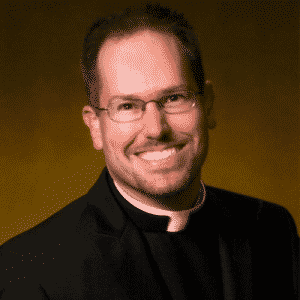
Fr. Rich recommends his homily for the Third Sunday of Lent in 2017 as a “particularly Paulist” theme — “The Model Dialogue: Jesus and the Samaritan Woman.” In this homily, he explicitly explores the parishioners explicitly embody Paulist mission in their lives. In addition, you may want to check out his homily on St. Paul’s conversion.
All of his homilies and blog posts are rich with the message of living the gospel in daily life.
by Fr. Frank DeSiano, CSP
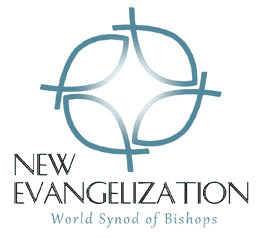
This idea was first put forward by St. John Paul II in his Apostolic Exhortation, “Catechesis in our Day,” in a small reference in #5: “at the heart of catechesis we find, in essence, a Person, the Person of Jesus of Nazareth …” After this brief reference, the General Directory for Catechesis of the Catholic Church started referring to faith as essentially conversion, a personal experience with Jesus Christ which leads us to think and judge like Jesus Christ. “Faith is a personal encounter with Jesus Christ making, of oneself, a disciple of him (#53).”
I think language like this challenges a lot of our basic attitudes as missionaries and catechists. For many centuries, the Church has emphasized the propositional idea of faith. When we believe, we accept those things that God has proposed. In fact, the Nicene Creed which we say on Sunday is the foremost reference that many Catholics have about the substance of their faith. As we recite the words of the Creed, we are affirming those propositions we consider central to our common Catholic faith.
However, it is one things to introduce proposition to someone; it is quite another thing to introduce a person to someone. All of a sudden, we are not dealing with ideas but with relationships. We are invited to approach Jesus in a relational way, much as we approach our relatives or our friends. Moreover, this relationship to Jesus has to become a priority in our lives: that we somehow experience Jesus at the center of our attention and, indeed, of our affection.
This implies a revolution around the transmission of faith. Rather than something that principally happens through a classroom setting, faith calls for transmission through personal experience. Rather than questioning children or teens on whether they know this or that about the faith, we concentrate on their ability to articulate a relationship with Jesus which, obviously, can happen in a variety of ways: through art, prayer, song, writing in the second person (“You”), and other forms of personal expression.
Paradoxically this new, and I believe radical, direction happens at a time when the content of the Catechism receives almost exclusive emphasis in many areas of leadership in our Church. One hears of children being tested at various grades on the material they have learned in religion class; one sees bishops directing those who produce catechisms to conform more clearly to the language of the Catechism of the Catholic Church. Faith, in this approach, is about learning, and knowing, formulas.
To begin exploring what this new direction of “personal encounter” might look like, Paulist Evangelization Ministries developed a pastoral tool called “The Journey/El Camino.” This evangelizing and pastoral approach uses elements of “lectio divina” (particularly contemplation), group gathering, prayer, and video to create sessions that are predominantly relational in character. Sketching, through video, images of those people who encountered Jesus two thousand years ago, the materials then present the participants with the opportunity to recognize the same kind of encounter happening in their own lives.
Healing, as a result, is not studied by looking a definition of healing; rather, participants come to recognize the healing, and the need for healing, in their own lives, and how Jesus, the healer, is accessible to them through the Holy Spirit. Rather than affirming a doctrine such as “Jesus is the Son of God,” participants are put into a position where they can experience how Jesus discloses the reality of God through the intimacy he forms with them.
Of course, for Catholics, “encountering Jesus” is not only something that happens with one’s image of the person of Jesus (so often the blond-haired, blue-eyed Hollywood model so popular in our culture), but rather with the full experience of Jesus the Christ. Consequently, The Journey/El Camino explores in six sessions our experience of Jesus; then, in the six sessions of part 2, our experience of the community of Jesus; and, finally in the six sessions of part 3, our experience with Jesus’ way of life, with those qualities that make us disciples. In this way, a comprehensive set of experience is built up that brings participants far beyond the “Jesus and me” temptation that besets so much of Protestant American religious scene.
You can check The Journey/El Camino out at pemdc.org/thejourney. Here you can see testimonies and samples of the videos created for this program. This approach works for small groups, youth, dimensions of inquiry in the RCIA, and preparation for Confirmation.
Part of exploring “personal encounter” and “personal experience” entails acknowledging the many different ways Christ can be experienced. The tradition of mysticism in the Catholic Church helps us escape some of the simplicities and naivete in the way some people think about Jesus. Indeed, Jesus often can be construed only as “sweet Jesus” who consoles me and makes me feel good.
On the other hand, until we engage with Christ in the challenges he places before us, in the ways in which we feel distant from him, in the moments of dryness and desolation, we have not really discovered essential dimensions of faith.
More than anything, this sense of “personal encounter” with Christ demands that we reflect on what we are doing with inquiry, with our preaching, and with catechesis, on all levels, in our parishes. How can teaching and catechesis become more formation as disciples rather than classes in religion? How can, as people mature, Catholics primarily see themselves as personal followers of Jesus?
This new direction in transmitting the faith should open many imaginative doors in the approaches of Paulists and Paulist Associates today.
(This is a suggested format; each group may select another outline or topic.)
Thanks to Cathy Hoekstra, Paulist Associate from Grand Rapids and a member of the Paulist Associates Board, for preparing this month’s program.
Theme: Dorothy Day, the Seeker Saint
Opening Prayer: The Paulist Prayer Book, select the day on which you meet
Reading (in advance of the meeting)
“Dorothy Day” by Brett C. Hoover in All Holy Men and Women: A Paulist Litany of Saints, edited by Thomas A. Kane, CSP; pages 187-193
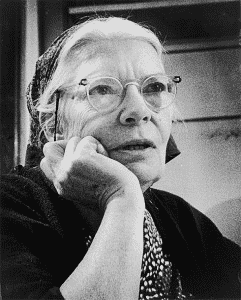
- In what ways can Servant of God Dorothy Day be an example and encouragement for the people in our age?
- What are some of the similarities between the lives of Isaac Hecker and Dorothy Day – what were their shared notions of spirituality?
- What aspects of the life of Dorothy Day inspire you and why?
News/Announcements
Closing Prayer: Prayer for the Intercession of Servant of God Dorothy Day
God our Creator, your servant Dorothy Day exemplified the Catholic faith by her conversion, life of prayer and voluntary poverty, works of mercy, and witness to the justice and peace of the Gospel.
May her life inspire people to turn to Christ as their Savior and guide, to see his face in the world’s poor and to raise their voices for the justice of God’s kingdom.
We pray that you grant the favors we ask through her intercession so that her goodness and holiness may be more widely recognized and one day the Church may proclaim her Saint.
We ask this through Christ our Lord. Amen.
You may be interested in seeing the movie Entertaining Angels: The Dorothy Day Story, which was released by Paulist Productions in 2000. The film stars Moira Kelly and Martin Sheen.
In addition, check out three books on the Paulist Press website:
- Dorothy Day, Champion of the Poor, by Elaine Murray Stone
- Ishi Means Man: Essays on Native Americans by Thomas Merton, forward by Dorothy Day
- The Great Catholic Reformers: From Gregory the Great to Dorothy Day, by C. Colt Anderson
The Paulist Associates and Paulists alike enjoy hearing about the ways that we continue to live out our Christian faith in daily living. Your witness enriches the everyone’s faith.
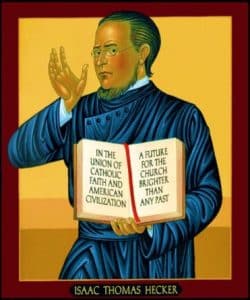
Look upon us this day, with compassion and hope. Hear our prayer. We ask that through the intercession of Father Hecker your servant, you might grant us (state the request).
We ask this in the name of Jesus Christ, Your Son, Our Lord, who lives and reigns with You and the Holy Spirit. One God, forever and ever. Amen.
When you pray this prayer, and if you believe that you have received any favors through Hecker’s intercession, please contact the Office of the Cause for Canonization of Servant of God, Isaac Hecker at [email protected]. Visit the web site: isaachecker.org to learn more about his life and the cause for his canonization.
Paulist Associates National Director
Frank Desiderio, C.S.P.
Paulist General Office
New York, NY 10023
Board Members
Angie Barbieri
Toronto, ON, Canada
Paula Cuozzo
Boston, MA
Cathy Hoekstra
Grand Rapids, MI
Mike Kallock, C.S.P.
Katherine Murphy Mertzlufft
Columbus, OH
Joe Scott, C.S.P.
I believe that I am drawn by the Holy Spirit to the spirituality and qualities of the Paulist Community. I have discerned both by prayer and study that God calls me to become associated with the Paulists. I promise that I will pray for the works of the Paulist Society, meet with others, who are also members of the Paulist Associates, for spiritual sharing and formation; and I seek to embody the apostolic qualities of the Paulists in my daily life.
Attentive to the Holy Spirit and faithful to the example of St. Paul and the charism of Father Isaac Hecker, I commit myself for one year of membership in the Paulist Associates.
